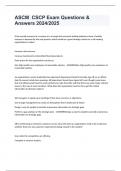ASCM CSCP Exam Questions & Answers 2024/2025
If the overall economy of a country is in a trough but economic leading indicators show a healthy increase in demand for the next quarter, which would be a good strategic choice for a risk-seeking organization to make?
Increase cash reserves.
Increase investments in diversified financial products.
Raise prices for the organization's products.
Hire high-quality new employees at reasonable salaries. - ANSWERSHire high-quality new employees at reasonable salaries.
An organization's senior leadership has asked each department head to formally sign off on an official date for several retail store openings. All department heads have signed off, even though some know that everything would need to work perfectly to make that date and that there are some major cultural issues in the way at some locations. What does this organization need to do to get this critical information to decision makers?
Tell managers to speak up at meetings if they have concerns or objections.
Use change management to create an atmosphere that is intolerant of failure.
Design a way for people to provide anonymous information on strategic gaps.
Perform a gap analysis on the strategic plan. - ANSWERSDesign a way for people to provide anonymous information on strategic gaps.
After performing an extensive customer survey, what else does an organization need to do to discover whether there are any customer requirements being missed in the market?
Scan what the competitors are offering.
Complete a variance analysis. Perform brainstorming.
Perform internal benchmarking. - ANSWERSScan what the competitors are offering.
According to macroeconomic theory, as aggregate prices decrease, what happens to the real gross domestic product (GDP), and why?
Real GDP decreases, because there is less consumption spending.
Real GDP increases, because there is more real wealth.
Real GDP decreases, because suppliers are less motivated to produce.
Real GDP increases, because there is deflation. - ANSWERSReal GDP increases, because there is more real wealth.
In a service industry such as an electrical utility supply chain, which of the following is a Tier 1 supplier?
Facility maintenance
Steel manufacturer for electric transformers
Manufacturer of coal excavator equipment
Commercial customer - ANSWERSFacility maintenance
Tier 1 suppliers in this supply chain include fuel suppliers, janitorial services, and facility maintenance. The steel manufacturer and the manufacturer of coal excavator equipment would both be considered Tier 2 suppliers, as they produce products needed by the Tier 1 suppliers. Commercial customers are a customer type for the electric utility, not a supplier.
What is prompting many countries to adopt the International Financial Reporting Standards (IFRS)?
Growth in international shareholders and trade
Mandate for the U.S. and China to adopt it
Financially advantageous due to the loopholes it creates
Developed by the United Nations with support from multiple countries - ANSWERSGrowth in international shareholders and trade The APICS Dictionary, 15th edition, defines the International Financial Reporting Standards (IFRS) as follows: "A common global language for business affairs so that company accounts are understandable and comparable across international boundaries. As a result of growing international shareholding and trade, they are rules to be followed by accountants to maintain books of accounts which is comparable, understandable, reliable, and relevant as per the users internal or external."
If each step of a supply chain adds value, what else can the customer expect to see aside from utility?
Agility, availability, and price
Special discounts; first come, first-served ordering; and product differentiation
Attractiveness, price, and availability
Appealing features, multiple uses, and price - ANSWERSAttractiveness, price, and availability
The goal is to add value at each step in a service-oriented value chain as well as in a manufacturing-
oriented supply chain. Utility may not be the only value, or worth, of a good or service from a customer's
point of view; price, availability, and attractiveness are also values to consider.
Proactively managing risk rather than being reactive provides which of these benefits to the organization?
Ability to be risk-seeking
Competitive advantage
Risk elimination
Lower up-front costs - ANSWERSCompetitive advantage
Managing risk proactively gives an organization an edge over its competition because the organization will respond to risks quickly, become more flexible, and feel prepared in the face of uncertainty.
A firm's highest stage of production is manufacturing resource planning (MRP II), it uses informal demand planning with disconnected spreadsheets for the supply chain, and it has online catalogs on the internet. What stage of supply chain development has the firm reached?
Multiple dysfunction
Semifunctional enterprise
Integrated enterprise Extended enterprise - ANSWERSSemifunctional enterprise
At Stage 2, semifunctional enterprise, a firm has adopted MRP II, its demand planning is still done informally, and its internet capability has not progressed beyond online catalogs.
In a low-price supermarket chain, the stores, the distribution centers, the third-party logistics provider, and the manufacturers work together to replace what is sold in the stores within less than 24 hours. What type of supply chain structure does that illustrate?
Reactive
Customer-responsive
Stable
Reactive efficient - ANSWERSThis is an example of a reactive efficient supply chain structure. Such structures:
Support competitive positioning by serving as an efficient, low-cost, integrated unit.
Focus efficiency and cost management on the total delivered cost of finished goods.
Place greater importance on connectivity technology and new equipment to automate functions to reduce labor costs and improve capacity and throughput.
Direct materials plus direct labor plus manufacturing overhead equals:
the supply chain management cost.
the cost of goods sold.
the overall value at risk.
the cost to make and market. - ANSWERSThe cost of goods sold (COGS) equals direct materials plus direct labor plus manufacturing overhead.
Which of the following statements about purchased customer data is true?
The data paint a picture of a business's own customers.
The data may be more useful for new customer acquisition.
The data are useful in managing relationships with existing customers.




